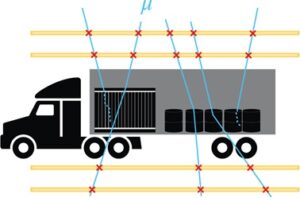
A Californian company, Decision Sciences International Corporation (DSIC or Decision Sciences), has developed a unique and groundbreaking technology capable of determining the atomic number and bulk density of materials by analysing the trajectories of charged particles.
Like X-rays, this new technology can look inside objects and display its structure and composition, discriminating between different materials, detecting voids and anomalies, hidden objects and suspicious materials. Unlike X-rays, Discovery, the name of the new device incorporating the technology, produces detailed 3D images that reveal the internal structure of the objects much more clearly than a single two-dimensional picture.
Cosmic rays constantly bombard Earth, interacting with atmospheric atoms and giving rise to subatomic charged particles known as muons and electrons. These naturally occurring particles permeate our environment, with over 10 thousand of them passing through the human body every minute, without any adverse effects. Unlike artificially generated X-rays, which can be extremely harmful, these charged particles are natural components of our environment with which we already live with every day of our lives!
According to the company, electrons are stopped by most of the usual materials, including organic materials and substances. Muons however, can penetrate deep under the Earth’s surface, going even through high-density materials, like rock, metals, concrete and lead. In these high-density materials muons scatter a lot. The amount of the scattering can be measured with large detector planes.
The scattering angle conveys the information on the type of materials that the muon penetrated. Collecting many muons one can define the internal structure and material composition of the objects. Muon tomography isn’t just a lab experiment as executed by DSIC —it’s already in action. Decision Sciences offer a commercial vehicle and cargo screening solution branded Discovery based on over 14 years of R&D and 246 patents, that has been used around the globe.
Discovery offers many interesting and valuable things. Based on physics, tomographical principles and computer vision, inherently using AI and the latest ML it is able to detect shielded nuclear materials, find explosives, drugs and chemicals (technically anomalies) that shouldn’t be present in the commercial cargo under inspection. And, it has been designed to efficiently process large objects, trucks and sea containers.
Like X-rays, it can look inside objects and display its structure and composition, discriminating between different materials, detecting voids and anomalies, hidden objects and suspicious materials. Unlike X-rays, Discovery produces detailed 3D images that reveal the internal structure of the objects much more clearly than a single two-dimensional picture.
Remarkably, according to Decision Sciences, this technology capability is totally passive and doesn’t use any harmful radiation, but instead only naturally occurring charged particles. It is therefore offered as completely safe for the drivers, the operators, and any type of cargo. As such, this technology could be a true game-changer for security professionals worldwide, who can now perform their duties efficiently without worrying about the adverse health effects of ionising radiation.











